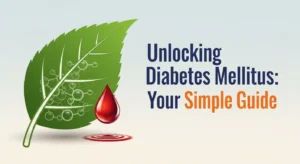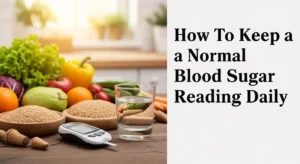Have you ever felt tired, thirsty, or just “off” without knowing why? These feelings are common, but sometimes, they can be quiet whispers from your body trying to tell you something important. Specifically, they might be early signs of high glucose symptoms, also known as hyperglycemia.

High blood glucose happens when your body doesn't handle sugar (glucose) properly. Over time, if left unchecked, it can lead to serious health problems like type 2 diabetes, heart disease, and nerve damage. The tricky part is that the early symptoms are often mild and can be easily mistaken for everyday stress, lack of sleep, or just getting older. Because of this, many people miss these crucial warnings.
In this article, we'll shine a light on these early high glucose symptoms that most people overlook. Knowing what to look for can help you take action sooner, potentially preventing bigger health issues down the road. Let's learn how to listen to your body and understand its signals.
High Glucose Symptom Checker
Answer these questions to get a general idea if you should talk to your doctor about high glucose symptoms. This is not a diagnosis tool.
1. Do you feel unusually thirsty, even after drinking a lot of water?
2. Do you need to urinate more often than usual, especially at night?
3. Do you feel constantly hungry, even after eating meals?
4. Do you feel unusually tired or have low energy, even with enough sleep?
5. Have you noticed any blurred vision that comes and goes?
6. Do cuts, sores, or infections seem to heal very slowly?
7. Have you experienced tingling or numbness in your hands or feet?
8. Have you lost weight without trying (without changes to diet or exercise)?
9. Do you experience dry, itchy skin that doesn't improve with moisturizers?
10. Have you noticed increased irritability or mood swings without a clear reason?
Key Takeaways
- Early high glucose symptoms are often subtle: They can be mistaken for everyday issues like tiredness or stress, making them easy to miss.
- Common early signs include: Increased thirst, frequent trips to the bathroom, constant hunger, and feeling unusually tired.
- Other overlooked symptoms: These can involve blurry vision, slow-healing cuts, tingling in hands or feet, and unexplained weight loss.
- Why early detection matters: Recognizing these signs quickly allows you to make lifestyle changes or seek medical advice, which can prevent serious health problems like type 2 diabetes.
- Don't ignore persistent changes: If you notice several of these symptoms happening often, it's a good idea to talk to your doctor.
Understanding High Glucose Symptoms (Hyperglycemia)
Before we dive into the high glucose symptoms, let's quickly understand what high glucose means. Our bodies get energy from glucose, which comes from the food we eat. A hormone called insulin, made by the pancreas, helps glucose move from our blood into our cells to be used for energy.
When you have high blood glucose, it means there's too much sugar in your bloodstream. This can happen for a few reasons:
- Not enough insulin: Your pancreas might not be making enough insulin.
- Insulin resistance: Your cells might not be responding well to the insulin your body does make.
- Eating too much sugar/carbohydrates: While diet plays a role, it's usually a combination of diet and how your body processes sugar.
When glucose can't get into your cells, it builds up in your blood. This is like having a key that doesn't fit the lock – the sugar stays outside the cells, unable to provide energy where it's needed. Over time, these high glucose symptoms can indicate damage to blood vessels and nerves throughout your body.

The Sneaky Early Symptoms Most People Miss
Here are the early high glucose symptoms that often fly under the radar. Pay close attention to these subtle clues from your body.
1. Increased Thirst and Frequent Urination
This is one of the most classic early signs, but it's often dismissed as “I just need to drink more water” or “I've been drinking a lot of coffee.”
What happens: When you have too much glucose in your blood, your kidneys work overtime to try and filter it out. They pull extra water from your body to help flush out the sugar through your urine. These high glucose symptoms make you urinate more often (polyuria), especially at night. Because you're losing so much fluid, you feel very thirsty (polydipsia) and need to drink more.
Why it's missed:
- “I'm just dehydrated.”
- “I drank a lot of water today.”
- “It's hot outside.”
- “I'm getting older, my bladder isn't what it used to be.”
Tip: If you find yourself constantly reaching for water and making frequent trips to the bathroom, even if you haven't changed your fluid intake much, it's a sign worth investigating.
2. Constant Hunger (Even After Eating)
Feeling hungry all the time, even right after a meal, is another common early symptom.
What happens: Even though there's a lot of glucose in your blood, it can't get into your cells without insulin working properly. Your cells are essentially starving for energy. This sends a signal to your brain that you need more food, leading to increased hunger (polyphagia).
Why it's missed:
- “I'm just a big eater.”
- “I must not have eaten enough for breakfast/lunch.”
- “I'm stressed, so I'm eating more.”
Tip: If you find yourself feeling ravenous shortly after meals, or constantly snacking, it could be a sign your body isn't getting the energy it needs from the food you've already eaten.
3. Fatigue and Low Energy
Feeling unusually tired, even after a full night's sleep, is a very common and often overlooked sign.
What happens: As mentioned, your cells aren't getting the glucose they need for energy. This is like a car trying to run on an empty fuel tank, even though there's fuel floating around outside the tank. This lack of cellular energy makes you feel drained, sluggish, and tired.
Why it's missed:
- “I didn't sleep well last night.”
- “I'm just stressed from work.”
- “I'm getting older.”
- “Everyone feels tired sometimes.”
Tip: If this persistent fatigue impacts your daily life and doesn't improve with rest, it's a strong indicator that something might be off with your energy metabolism. Remember that managing your weight can also play a role in energy levels and overall health. You can explore ways to support healthy weight management, such as understanding what to expect when you try Liv Pure.
4. Blurred Vision
High blood glucose can affect your eyes, and blurry vision is one of the common high glucose symptoms.
What happens: High sugar levels can cause fluid to shift into and out of the lenses of your eyes, making them swell. This swelling changes the shape of your lens, affecting its ability to focus light correctly, leading to blurry vision. This is often temporary and might come and go.
Why it's missed:
- “I need new glasses.”
- “I've been staring at a screen too long.”
- “My eyes are tired.”
Tip: If your vision suddenly becomes blurry, especially if it clears up and then gets blurry again, don't just blame your screen time. It's a key sign that should prompt a check-up.

5. Slow-Healing Sores, Cuts, and Frequent Infections
Do your cuts and scrapes seem to take forever to heal? Are you getting more infections than usual?
What happens: High blood glucose can affect your body's ability to heal and fight off infections. It can damage blood vessels, reducing blood flow to tissues, which slows down healing. High sugar levels also weaken your immune system, making it harder for your body to fight bacteria and fungi. This can lead to more frequent skin infections, yeast infections (especially in women), and bladder infections.
Why it's missed:
- “It's just a small cut.”
- “I'm prone to infections.”
- “I didn't clean it well enough.”
Tip: If you notice that even minor cuts are taking weeks to heal, or you're experiencing recurring infections, it's a significant red flag.
6. Tingling or Numbness in Hands or Feet
This symptom, known as neuropathy, is often considered a later complication, but mild tingling can start early.
What happens: High glucose levels can damage nerves over time, especially in the extremities (hands and feet). This nerve damage can cause sensations of tingling, numbness, burning, or even pain. In early stages, it might just feel like a mild “pins and needles” sensation that comes and goes.
Why it's missed:
- “My hand fell asleep.”
- “I sat in a weird position.”
- “It's just circulation issues.”
Tip: If you frequently experience tingling or numbness in your hands or feet without a clear reason, it's important to mention it to your doctor.
7. Unexplained Weight Loss
Losing weight without trying might sound good to some, but it can be a concerning symptom.
What happens: When your body can't use glucose for energy, it starts breaking down fat and muscle for fuel instead. This leads to weight loss, even if you're eating more than usual due to constant hunger. Also, the excess urination means you're losing calories and fluids.
Why it's missed:
- “I'm happy about it!”
- “I must be eating healthier than I thought.”
- “I've been more active.”
Tip: If you're losing weight without actively trying through diet or exercise, especially if combined with other symptoms like increased thirst or hunger, it's a sign that warrants medical attention. For those interested in healthy weight management, you can learn more about strategies like a 3-day fast for weight loss and its potential benefits.
8. Dry, Itchy Skin
Skin issues can be subtle and easily blamed on weather or allergies.
What happens: Frequent urination can lead to dehydration, which dries out your skin. Poor circulation due to high glucose can also contribute to dry, itchy skin. Additionally, a weakened immune system can make you more prone to skin infections and fungal issues, which can cause itching.
Why it's missed:
- “It's winter, my skin always gets dry.”
- “I need more lotion.”
- “I'm allergic to something.”
Tip: Persistent dry, itchy skin that doesn't improve with moisturizers, especially if accompanied by other symptoms, could be a sign.
9. Mood Changes and Irritability
High blood glucose can impact your mood and mental well-being.
What happens: Fluctuations in blood sugar levels can affect brain function, leading to mood swings, irritability, anxiety, or difficulty concentrating. When blood sugar is high, you might feel sluggish and irritable. When it drops too low (which can happen if your body overproduces insulin in response to high sugar), you might feel anxious, shaky, or confused.
Why it's missed:
- “I'm just stressed.”
- “I didn't get enough sleep.”
- “It's just a bad day.”
Tip: If you notice uncharacteristic mood swings, increased irritability, or trouble focusing that isn't explained by other life events, consider if it could be related to your blood sugar.
Why Are High Glucose Symptoms Missed So Often?
The main reason these early high glucose symptoms are overlooked is their gradual onset and commonality.
- Gradual Onset: High glucose usually doesn't appear overnight. It builds up slowly, giving your body time to adjust, and making the changes seem less dramatic.
- Commonality: Many of these symptoms (tiredness, thirst, mood swings) are also symptoms of everyday life – stress, poor sleep, dehydration, or just getting older. It's easy to blame them on something else.
- Lack of Awareness: Many people simply aren't aware that these subtle signs can point to a serious underlying condition.
- Self-Diagnosis: People often try to self-diagnose and treat their symptoms (e.g., “I'm tired, I'll drink more coffee”) instead of considering a medical cause.
When to See a Doctor
If you experience one or two of these symptoms occasionally, it might not be a concern. However, if you notice several of these symptoms happening often, getting worse, or persisting for an extended period, it's crucial to talk to your doctor.
Don't wait until symptoms are severe. Early detection is key to managing high glucose and preventing long-term complications. Your doctor can perform simple blood tests to check your blood glucose levels, such as:
- Fasting Plasma Glucose (FPG) test: Measures your blood sugar after an overnight fast.
- Oral Glucose Tolerance Test (OGTT): Measures your blood sugar before and 2 hours after you drink a sweet liquid.
- A1C test: Provides an average of your blood sugar levels over the past 2-3 months.
These tests can determine if you have prediabetes (blood sugar levels higher than normal but not yet diabetes) or diabetes.

Managing High Glucose Symptoms
If your doctor diagnoses high glucose or prediabetes, there are many steps you can take to manage your blood sugar and improve your health:
- Healthy Diet:
- Focus on whole, unprocessed foods.
- Limit sugary drinks and refined carbohydrates (white bread, pasta, pastries).
- Eat plenty of vegetables, fruits, lean proteins, and healthy fats.
- Consider portion control.
- Regular Exercise:
- Aim for at least 150 minutes of moderate-intensity exercise per week (e.g., brisk walking, swimming, cycling).
- Physical activity helps your body use insulin more effectively and lowers blood sugar.
- Weight Management:
- Losing even a small amount of weight (5-10% of your body weight) can significantly improve blood sugar control.
- Explore healthy weight loss strategies that fit your lifestyle.
- Monitor Blood Sugar:
- If advised by your doctor, regularly check your blood glucose levels to understand how different foods and activities affect you.
- Medication (if needed):
- Your doctor might prescribe medication to help manage your blood sugar, especially if lifestyle changes aren't enough.
Taking proactive steps can help you reverse prediabetes or manage diabetes effectively, leading to a healthier and more energetic life.
Conclusion
The early signs of high glucose are often subtle, easily ignored, and frequently missed. From persistent thirst and hunger to unexplained fatigue and slow-healing cuts, these whispers from your body are important messages. By understanding and recognizing these early high glucose symptoms, you empower yourself to take control of your health. Don't dismiss persistent changes as just “part of life.” Listen to your body, talk to your doctor, and take proactive steps to keep your blood sugar in check. Your future health depends on it!








